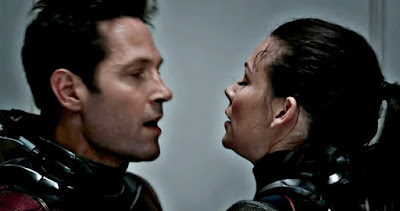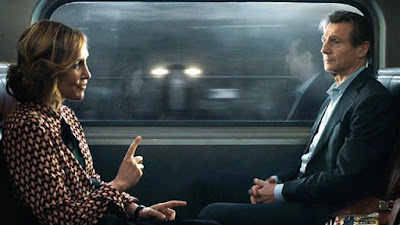Final Verdict: If you're a fan of the Harry Potter series and enjoyed both the movies as well as the last Fantastic Beasts film, then The Crimes Of Grindelwald, despite its share of issues, is ultimately worth the watch.
Thursday, March 12, 2020
Fantastic Beasts: The Crimes Of Grindelwald Entertains Despite Somewhat Uneven Storytelling
Final Verdict: If you're a fan of the Harry Potter series and enjoyed both the movies as well as the last Fantastic Beasts film, then The Crimes Of Grindelwald, despite its share of issues, is ultimately worth the watch.
Wednesday, March 11, 2020
The Maze Runner: Death Cure Concludes Its Popular Trilogy in A Fashion That's Both Respectable And Honorable
Movies based on best selling books are hard to transfer to the big screen. In most cases, these films fail to live up to the standard set by the source material. The ones that rarely succeed are either successful as their own standalone stories, or become sizable enough hits to generate their own franchises of films. The latter ended up being the case for The Maze Runner series with the first film performing well enough with audiences to spawn two sequels with The Scorch Trials, and the much-anticipated conclusion to the storyline titled Death Cure. Greenlighted at a time where The Hunger Games series was at it's prime in terms of being huge hits both critically and financially, Hollywood looked for every type of story with similar narrative structures to bring to the big screen in hopes of generating similar levels of success from box office and critical misfires such as The Giver to series that began strong but ended in disappointment such as the Divergent series. With The Maze Runner, the end result was being a low-level hit at the box office despite mixed reviews, that pushed its team to produce three full movies with the end result being diminishing box office returns despite the overall arc of the trilogy becoming more interesting. With Death Cure, The Maze Runner series comes to its fitting yet somewhat uneven conclusion, that wraps up its three film story arc in a matter that proves to be fairly satisfying for fans of the series.
Trials. Her chemistry with Brien remains strong and on point with the audience caring about their relationship. Thomas Brodie-Sangster once again steals the show and gives the main leads a run for their money as Thomas friend and partner Newt. His character has been one of the main highlights of the first two films in terms of casting with his performance here being no exception. His character carries his strongest and most emotional arc of all three films in Death Cure. Ki Hong Lee does well playing Minho, glader and former keeper of the runners of Goup A, who becomes Thomas best friend throughout the course of the series as he joined him to escape WICKER'S attempts to restore their memories along with saving the immunes from the maze. Will Poutler reprises his role from the first film as Gally, one of the head members of the running team, that was against Thomas from the start and saw him as trouble for the maze group. His characters transformation at the end of the first film to his surprise appearance here, proves to be both a genuine and slick surprise for the audience. Rosa Salazar from Alita: Battle Angel continues to impress as Brenda, a member of Thomas group who helps him, Minho, and Newt escape from WICKED'S headquarters. As for the older actors, Breaking Bad's Giancarlo Esposito returns from the second film as Thomas ally Jorge, leader of a group of rebels the Gladers met in The Scorch Trials. Game Of Thrones Aidan Gillen also reprises his role as Janson from the second Maze Runner with him, the assistant director of WICKED with Gillen continuing to chew up the scenery as one of the films main antagonists. Patricia Clarkson also shines as Ava, the trilogies central villain who happens to be the chancellor of WICKED as well as being the one responsible for both managing and organizing the search for a cure to the virus called Flare with her tactics including the sending of young teenagers into the Maze to study the minds of the immune. Other notable supporting roles are Barry Pepper as another ally of Thomas and the group Vince, Nathalie Emmanuel as Harriet, and Jacob Lofland as Ari's. One of the strongest elements of The Maze Runner trilogy has always been the type of actors the filmmakers choose to play the characters in the stories as everyone not only works well off each other, but demonstrate strong chemistry along with strength as an ensemble. The performances play a huge part in why the series was able to make it as far as it has on film with Death Cure being the emotionally fitting finale that the story requires it to be.
, returns to the writing chair to give The Maze Runner series its Return Of The King style finish to the story arc it's been building for a total of four years since the first movies release in 2014. For the most part, Nowlin succeeds in giving these characters, particularly Thomas, their proper closure to their journey while closing up every other subplot. Whereas the script as a whole succeeds in wrapping up the trilogies arc overall, it also suffers from tired old cliches and predictable moments that audiences saw coming a mile away, such as the films climactic helicopter scene. Despite the scene being well-executed, the audience knew what was going to happen before it did with the end result being a lessened impact than what the scenes reaction required in that moment. The script also shows that the franchise was growing tired with some of the same moments from previous films happening again in this one such as characters looking out at horizons along with windows. The script also has characters crying and then someone giving a heroic speech to reassure everyone (As well as the audience), that the main characters will prevail in the end. Add to that people pointing guns at each other without the intention of actually pulling the trigger and characters who were once thought to be dead later revealed to be alive (We're looking at you Gally). The scripts structure remains balanced for the most part, though occasionally runs the risk of being uneven at times due to the writers desire to throw everything possible into the movie to send the franchise out on a high note. He even goes as far as having one of the films main characters who died in the story, give an emotional final speech in a letter that Thomas character reads to the audience with the film showing what happens to each of the characters in the end. It certainly comes across as being mushy as well as cliched, but it manages to work in giving fans the happy ending they desire.
Final Verdict: For those who've seen the first two Maze Runner flicks but not this one, Death Cure is worth watching to see the trilogy conclude in a fashion that's both respectable as well as honorable.
Ant-Man And The Wasp Gives Marvel Fans The Much Needed Dessert After Bearing Avengers: Infinity War

Before the release of Avengers: Endgame, Marvel released it's much anticipated sequel to Ant-Man titled Ant-Man And The Wasp. The film not only served as being fun popcorn entertainment, but carried with it the task of making audiences laugh again after recovering from Infinity Wars shell-shocking climax. The film essentially provided audiences with the sweetest dessert after their first full-blown experience with the Infinity War saga. For Marvel fans as well as the studio itself, 2018 proved to be both a groundbreaking and defining year for the MCU as the universe had reached its first full ten years of functioning. With Black Panther starting out that year on a tremendous note both critically and financially, Infinity War followed suit not just being the most successful Avengers
film to date prior to the release of Endgame, but also marked a massive improvement over Age Of Ultron both financially and in terms of overall quality. With the success of those films, the expectations were set for Ant-Man And The Wasp to deliver a similar splash with audiences, while lighting the tone significantly as audiences were left devastated by Infinity War's finish along with waiting anxiously to see how Endgame concluded. Thankfully Ant-Man And The Wasp lives up to those expectations while essentially giving both Marvel fans, as well as audiences a detour from the intensity of the Infinity War saga.
Final Verdict: For fans of the Marvel Cinematic Universe or Paul Rudd in general, Ant-Man And The Wasp is absolutely worth watching even if it doesn't stack as high as the recent additions to the MCU.
The Commuter Is A Serviceable Action Movie Made Watchable Thanks To Its Main Star
When one thinks of the most generic action movie plot involving the family of the main character being threatened by the films main antagonist in order to gain leverage over them, generally an action flick with Liam Neeson as the main star with him in full Taken mode comes to mind. In the case of The Commuter, what you essentially get is a remix of a previous Neeson film titled Non-Stop with the main difference being the setting is now set on a train instead of an airplane. Liam Neeson's newest action/Hitchcockian style thriller The Commuter, serves as being a midly entertaining yet generic action flick, that basically recycles every cliched subplot in the book, yet is made watchable due to Liam Neeson's commanding screen presence both as a dramatic actor and action movie star.
Final Verdict: For both action and Liam Neeson fans, The Commuter works as being an interesting and mildly exciting train ride that warrants at least watch on the basis of being reasonably entertained.
Subscribe to:
Comments (Atom)























































